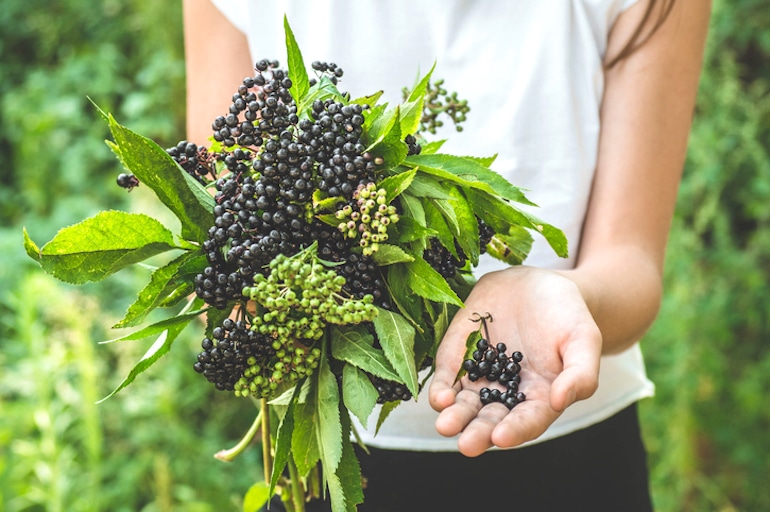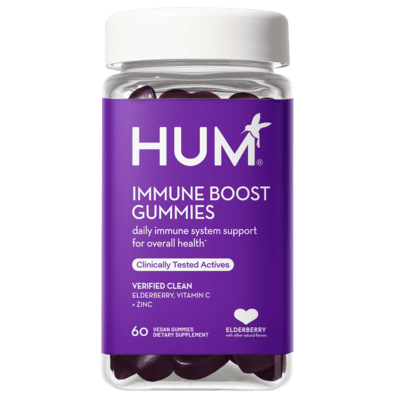3 Dietitian-Approved Ways Elderberry Can Support Your Overall Health
By Gaby Vaca-Flores, RDN, CLE •
August 17, 2021
Medically Reviewed By
Gaby Vaca-Flores, RDN, CLE
Registered Dietitian Nutritionist
What are the benefits of elderberry? Gaby Vaca-Flores, RDN, CLE, shares elderberry’s promise for immune support and more.
People have used elderberry for centuries to promote overall well-being. It’s a potent plant for immune health and can be a top ingredient to reach for if you’re feeling under the weather.
While natural approaches can sometimes sound too good to be true, elderberry tops the list of immune-supportive ingredients. In this article, we’ll reveal the science-backed benefits of elderberry.


What is elderberry?
Elderberry is a shrub from the Adoxaceae family and is also called elder or Sambucus tree. While it’s traditionally used around the world, elderberry is native to Europe and North America. It’s characterized by its white flowers and ultra-small black-purple berries. While elderberry has earned a therapeutic reputation, it’s also widely known for its culinary and practical applications. To date, elderberries are used to make tart-flavored jams, sauces, pies, tea, and even wine. Additionally, Native Americans made use of the branches to make flutes, baskets, and other household items.
What are the benefits of elderberry?
Elderberry’s medicinal benefits are mainly attributed to its impressive nutrient and compound profile. Here’s what makes it stand out.1. Elderberry Is High in Phenolic Compounds
Elderberry is full of beneficial organic compounds called polyphenols. Specifically, elderberry delivers a subgroup of polyphenols called anthocyanins. Researchers are still trying to understand the exact way anthocyanins work in the body, but there’s a great deal of research indicating the promising role of polyphenol consumption in human health. A few of its proposed benefits include:- protection of pancreatic beta-cells, which regulate glucose and produce insulin
- weight management, as some animal studies suggest that blueberries (a rich source of anthocyanins) may reduce weight gain
- gut health balance, since anthocyanins may impact the gut microbiome via immune cells present in gut-associated lymphoid tissue
2. Elderberry Delivers Antioxidants
Deeply pigmented fruits such as elderberries deliver higher amounts of antioxidants compared to their light-colored counterparts. Antioxidants are an umbrella term for certain vitamins (like vitamin C) and phenolic and flavonoid compounds (like the ones mentioned above). These have the potential to inhibit cellular oxidation. In other words, they help clear out harmful free radicals which in turn protect against oxidative stress. In fact, one study found that elderberry reduced the production of excessive ROS (a type of radical) in colon cells by 22 percent and oxidative DNA damage by 46 percent. Given their ability to neutralize or delay cellular damage, antioxidant benefits cascade across many areas of human health, including:- immunity
- heart and eye health
- skin aging
3. Elderberry Supports Immune Health
Elderberry’s role in supporting our immune defenses is arguably one of its most well-known and researched benefits. Researchers believe that elderberry supports immune health by improving white blood cell activity. White blood cells (such as macrophages and lymphocytes) are the powerhouses of the immune system and are critical for optimal function. There are numerous studies that have investigated the effects of consuming elderberry on the immune system. A 2019 meta-analysis of four clinical trials found that at the onset of upper respiratory symptoms, elderberry supplementation substantially reduced overall symptom duration and severity compared to control groups. The symptoms evaluated were consistent with the common cold, including cough and nasal congestion. While the latest research on elderberry’s benefits for immune support is very promising, ongoing research is needed to solidify its effect on healthy individuals.
What to Know Before Supplementing with Elderberry
Clearly, the benefits of elderberry are hard to ignore. However, before adding it to your routine, note that the National Center for Complementary and Integrative Health warns against consuming raw elderberry. Different parts of the elderberry tree—including its bark, leaves, and root—are dangerous to consume. In its raw form, elderberry contains cyanogenic glycosides, which the stomach hydrolyzes into hydrogen cyanide (HCN). HCN is a poisonous compound that can result in GI discomfort in the form of nausea and vomiting. In large quantities, exposure to HCN may even require hospitalization. The good news? Cooked berries don’t run this risk. You can also take it in safe supplemental forms like elderberry gummies that contain elderberry extract.Final Thoughts
To recap, elderberry is a plant traditionally used to support immune health. Its impressive polyphenol and antioxidant profile make it a top contender for promoting overall wellness. It also has a substantial body of research backing up its therapeutic properties. For the safest experience, it’s best to cook elderberries—or, more conveniently, reach for an elderberry supplement containing the shrub’s extract.More like this









